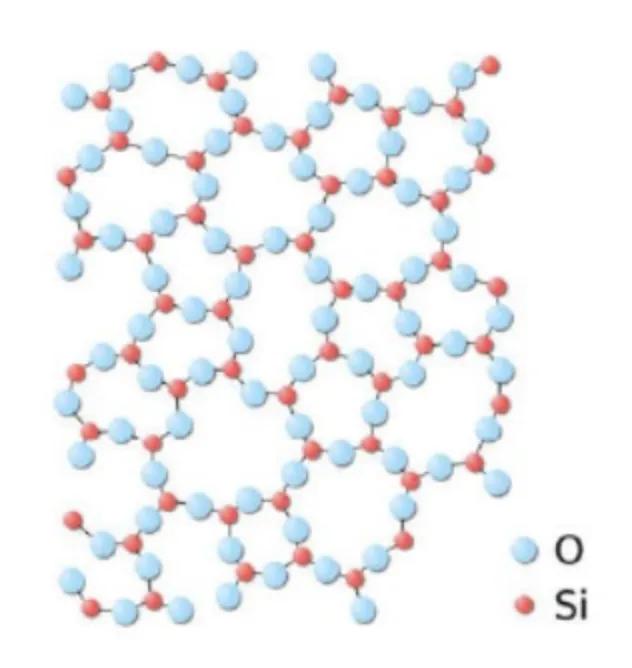What makes quartz glass the King of Glass?
Quartz glass is a special industrial technical glass composed of a single component of silicon dioxide (SiO2), which has a series of superior properties that ordinary glass can't match. It is praised as "the king of glass" by experts in new materials and is an important basic material for strategic emerging industries such as modern information industry, optics, photovoltaics, semiconductors, and national defense fields such as aerospace.
I. Structural characteristics of quartz glass
The pure quartz glass consists of a single component of silicon dioxide (SiO2). In quartz glass, the Si-O bonds are arranged in a short-range order and long-range disordered state. Due to the strong and stable bond energy of Si-O bonds, quartz glass has high softening temperature, excellent spectral transmittance, extremely low thermal expansion coefficient and electrical conductivity, high chemical stability, radiation resistance, and longer service life under extreme conditions.

II. Properties and applications of quartz glass
Optical performance Quartz glass has a series of excellent optical properties. Compared with ordinary glass, high-purity quartz glass has good transmittance from far ultraviolet (160nm) to far infrared (5μm), which is not possessed by general optical glass. The excellent spectral transmittance and optical uniformity make quartz glass widely used in semiconductor lithography and precision optical devices.
Besides, quartz glass has good radiation resistance. Radiation-resistant quartz glass has been widely used as the window material of the "Shenzhou" series spaceships and the protective cover of key parts of the "Tiangong" series space laboratories.
Mechanical properties
Similar to ordinary glass, quartz glass belongs to brittle hard materials. Like ordinary glass, the strength parameters of quartz glass are affected by many factors, including surface state, geometric shape, and testing method. The compressive strength of transparent quartz glass is generally 490~1960MPa, the tensile strength is 50~70MPa, the flexural strength is 66~108MPa, and the torsional strength is about 30MPa.
Electrical properties
Quartz glass is an excellent electrical insulator. Compared with ordinary glass, quartz glass has a higher resistivity, reaching up to 1.8×10^19Ω·cm at room temperature. Besides, quartz glass has a higher breakdown voltage (about 20 times that of ordinary glass) and lower dielectric loss. The resistivity of quartz glass decreases slightly with increasing temperature, and the resistivity of opaque quartz glass is lower than that of transparent quartz glass.
Thermodynamic properties
Due to the almost complete strong Si-O bond interaction inside quartz glass, its softening temperature is very high, and the long-term working temperature can reach 1000℃. Additionally, the thermal expansion coefficient of quartz glass is the lowest among common industrial glasses, with a linear expansion coefficient of 5×10^-7/℃. After special treatment, quartz glass can even achieve zero expansion. Quartz glass also has excellent thermal shock resistance, meaning it won't crack within a short time when repeatedly experiencing extreme temperature differences. These excellent thermodynamic characteristics make quartz glass unreplaceable in high-temperature and extreme working environments.
Chemical properties
Quartz glass has very good chemical stability. Unlike other commercial glasses, quartz glass has extremely high chemical stability towards water, making it applicable in water distillers with high purity requirements for water. Quartz glass has excellent acid resistance and salt resistance; it reacts with few substances except hydrofluoric acid, phosphoric acid, and alkaline salt solutions. Compared with acid and salt solutions, quartz glass has poorer alkali resistance and will react with alkali solutions at high temperatures. Besides, quartz glass does not react with most oxides, metals, non-metals, and gases at normal temperatures. The extremely high purity and good chemical stability make quartz glass applicable in environments with high production condition requirements such as the semiconductor manufacturing industry.
RELATED NEWS
CATEGORIES
LATEST NEWS
CONTACT US
Name: Ted Yu
Mobile:+86 13651003083
Tel:+86 13651003083
Whatsapp:+8613651003083
Email:sales@yzsyoptics.com
Add:Tuoli Industrial Park ,Qinglonghu Town 102471,Fangshan District,Beijing ,China
